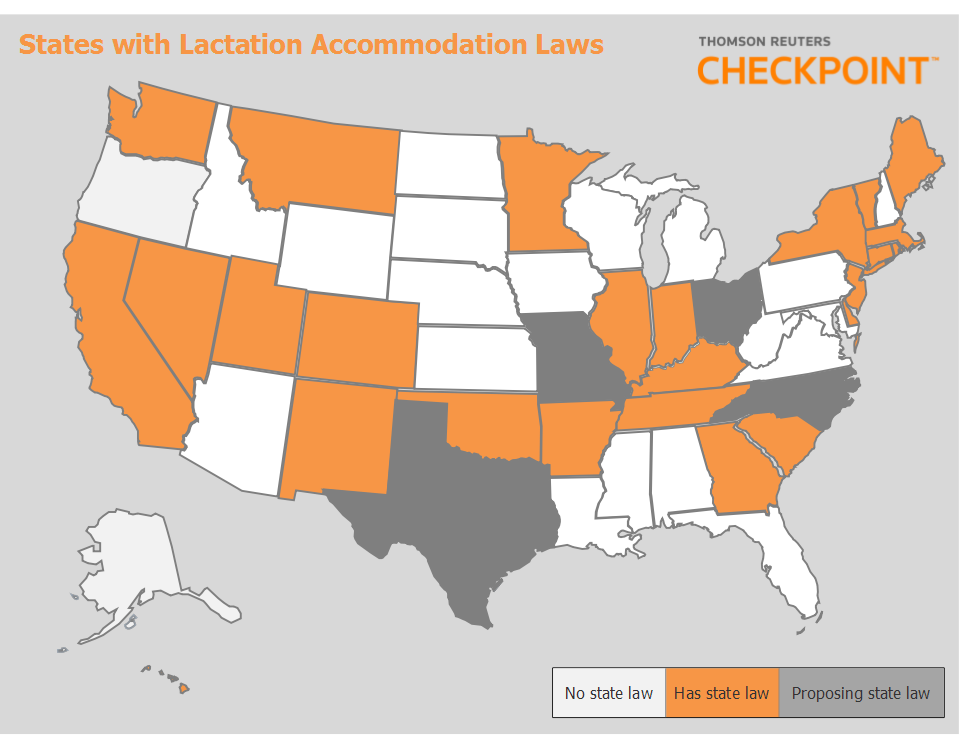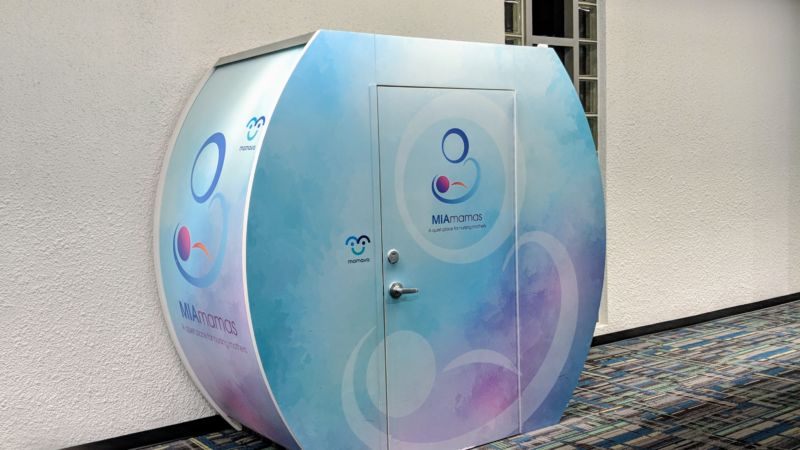Twenty-seven states, the District of Columbia, and the cities of Baltimore, New York and Pittsburgh have requirements regarding lactation accommodations and breaks on the books.
A jury recently awarded $3.8 million to a Tucson fire paramedic who worked for the city of Tucson when the department failed to provide a private space for her to pump breast milk [Clark v. City of Tucson, DC AZ, Dkt. No. CV 14-02543-TUC-CKJ, 4/18/19].
Plaintiff Carrie Ferrara Clark claimed, upon returning from maternity leave, the Tucson Fire Department (TFD) failed to provide lactation accommodations as required under the Fair Labor Standards Act (FLSA). The TFD freely admitted it didn’t have a lactation policy in place. Further, Clark was assigned to a “swing shift” which meant she was assigned from station to station, several of which were noncompliant. Clark ended up calling out sick to avoid working in those stations. Clark also alleged retaliation when she asserted her right to lactation accommodations. The jury found for Clark.
The jury award is a warning to employers that fail to provide reasonable accommodations to nursing employees.
The FLSA was amended in 2010 to require FLSA-covered employers to provide reasonable unpaid break time to an employee to express breast milk for her nursing child for one year after the child’s birth. Additionally, employers are required to provide a private location, other than a bathroom. The FLSA provides an undue hardship exemption for employers with fewer than 50 employees. Since the FLSA was amended, states have responded with lactation accommodation laws with both break requirements and private space requirements [Fact Sheet #73: Breaktime for Nursing Mothers under the FLSA; FAQs – Break Time for Nursing Mothers].

The following states have lactation accommodation laws:
- Arkansas. Daily unpaid break time must be provided to an employee to express breast milk for her child in order to maintain milk supply and comfort.
- California. Employees must be given a reasonable break in order to express breast milk. If possible, the break should run concurrently with other rest time. Break time for an employee that does not run concurrently with the rest time authorized for the employee is considered unpaid time.
- Colorado. Employers are required to provide reasonable unpaid break time or permit an employee to use paid break time, meal time, or both, each day to express milk for a nursing child for up to two years after the child’s birth. Employers are required to provide a location near the work area, other than a toilet stall, to express milk in privacy.
- Connecticut. Reasonable break time must be provided for employees to express breast milk for a nursing child. Accommodations must be provided for privacy.
- Delaware. Employers must provide “reasonable accommodations” to nursing employees. “Reasonable accommodations” include break time and appropriate facilities for expressing breast milk.
- District of Columbia. Reasonable daily unpaid breaks must be provided for employees to express breast milk for a child. Employer should make reasonable efforts to provide a sanitary room other than a toilet stall for privacy.
- Georgia. Daily unpaid break time must be provided for employee to express milk. Employers must make reasonable efforts to provide private accommodations other than a toilet stall.
- Hawaii. Employers with 20 or more employees must provide reasonable break time to express milk for a nursing child for one year after the child’s birth each time the employee has a need to express breast milk.
- Illinois. Employees must be provided reasonable unpaid breaks in order to express breast milk for an infant child, unless it would unduly disrupt the employer’s operation. The break time, if possible, must run concurrently with any break time already provided to the employee.
- Indiana. Employers with more than 25 employees must provide a private location other than a toilet stall for employees to express breast milk and if possible private employers must provide a refrigerator for storing breast milk.
- Kentucky. Employers with 15 or more employees for 20 or more calendar weeks are required to provide frequent or longer breaks to express breast milk for a nursing child.
- Massachusetts. Employers with six or more employees are prohibited from denying reasonable lactation accommodations to an employee who must express breast milk for a nursing child. Employers are required to provide a private non-bathroom space for expressing breast milk.
- Maine. Adequate unpaid break time must be provided to employees or employees must be permitted to use paid break time or meal time each day to express breast milk for a nursing child for up to three years following childbirth. Reasonable efforts must be made to provide a clean room, other than a bathroom, where an employee may express milk in privacy.
- Minnesota. Daily unpaid break time must be provided to an employee to express breast milk. Reasonable effort must be made to provide a private location other than a toilet stall.
- Mississippi. Employers are required to permit an employee to express breast milk during any meal period or other break period provided by the employer.
- Montana. Daily unpaid break time must be provided to an employee to express breast milk. Reasonable effort must be made to provide a private location other than a toilet stall.
- Nevada. Employers are required to provide time and an appropriate place (not a bathroom) for mothers with children under one year of age to breastfeed or express milk (with or without compensation). An employer with fewer than 50 employees is not subject to these requirements if the requirements would impose an undue hardship on the employer.
- New Jersey. An employer must provide reasonable break time each day and a suitable location for an employee who is breastfeeding to express her milk in private in a location, other than a toilet stall, that is in proximity to the employee’s workstation.
- New Mexico. Employers must provide a clean and private place other than a toilet stall for employees to express breast milk. Employers must provide unpaid break time for employees to express breast milk.
- New York. An employer must provide reasonable unpaid break time, or permit an employee to use paid break time or meal time each day to express breast milk for her nursing child for up to three years following childbirth.
- Oklahoma. Reasonable unpaid daily break time must be provided to an employee to express breast milk for a child.
- Oregon. Oregon recently revised its lactation accommodations provisions. Currently, employers are required to provide an unpaid 30 minute break for each four hour shift to breastfeed or express breast milk. However, beginning Sept. 29, 2019, employers will only be required to provide a “reasonable rest period” for lactation purposes. Recently passed legislation also applies the provisions to all employers but provides an undue hardship exemption to employers with 10 or fewer employees.
- Rhode Island. Employers must provide reasonable accommodation for nursing mother unless the employer can demonstrate that such accommodation would impose an undue hardship. “Reasonable accommodations” include break time and private non-bathroom space for expressing breast milk.
- South Carolina. Employers are required to provide reasonable lactation accommodations. Accommodations may include frequent or longer breaks, providing a private space other than a bathroom stall, for expressing milk. Employers are not required to provide paid breaks unless the employees uses a break period that is normally compensated.
- Tennessee. Daily unpaid break time must be provided for a mother to express breast milk for a child. Employers should make a reasonable effort to provide a private location other than a toilet stall for such purposes.
- Utah. Employers with 15 or more employees are required to provide reasonable accommodations to an employee who is breastfeeding a nursing child.
- Vermont. Employers are required for three years after the birth of a child to provide reasonable time throughout the day to express breast milk for a nursing child and provide an appropriate private space that is not a bathroom stall.
- Washington. Beginning July 28, 2019, employers with eight or more workers are required to provide reasonable break time to employees to express breast milk for two years after a child’s birth as needed. Employers must provide a location, other than a bathroom, at the worksite. Religious and other nonprofit organizations are exempt from the provisions.
Additionally, three cities have passed lactation accommodation ordinances:
New York City requires employers with 15 or more employees are required to provide a lactation room to a nursing employee. Employers must also develop, implement, and distribute to all new employees written notification regarding the company’s lactation policies.
Baltimore requires employers with two or more full-time employees to provide a reasonable amount of break time to accommodate an employee who desires to express breast milk. Break time must run concurrently with any paid rest or break time already required by law or otherwise authorized for the employee. Break time may be unpaid if it does not run concurrently with a paid break required by law. An employer must provide a private lactation location other than a bathroom or closet in close proximity to the employee’s work area. Employers are required to develop and implement a written lactation accommodation policy.
Pittsburgh requires employers to initiate an interactive process with employees who may require reasonable accommodations such additional breaks or providing access to refrigeration for milk storage.
Meanwhile, Missouri, North Carolina, Ohio, and Texas have proposed lactation accommodation bills in the current legislative session.
The takeaway.
Laws regarding breaks and worksite accommodations vary from state to state. Employers should familiarize themselves with the lactation accommodation laws in each state in which they have workers employed. Employees of employers subject to the FLSA who fail to provide a reasonable break period and private worksite location may file suit seeking employment, reinstatement, lost wages, and liquidated damages equal to lost wages.
Try payroll products on Thomson Reuters Checkpoint free for 30 days!
See why thousands of payroll professionals trust Thomson Reuters for their payroll information needs. Because we know your time and money is valuable, we offer trial access to some of our most popular payroll products.
Shop now for payroll solutions designed to help you find trusted answers quickly.








